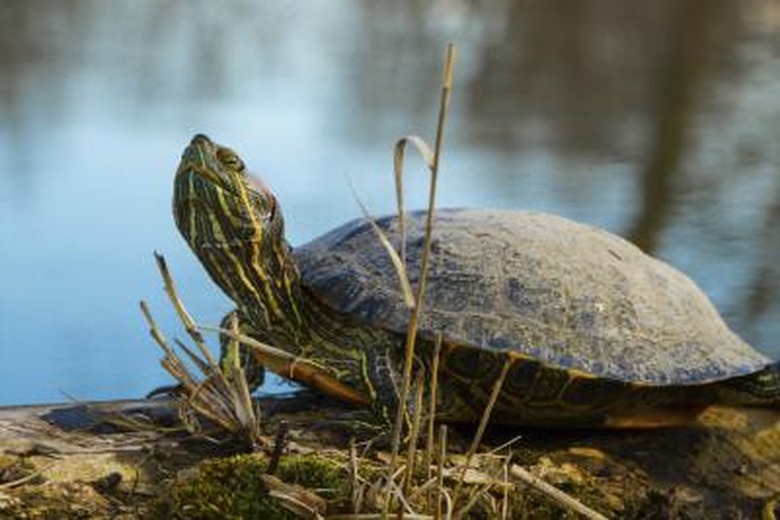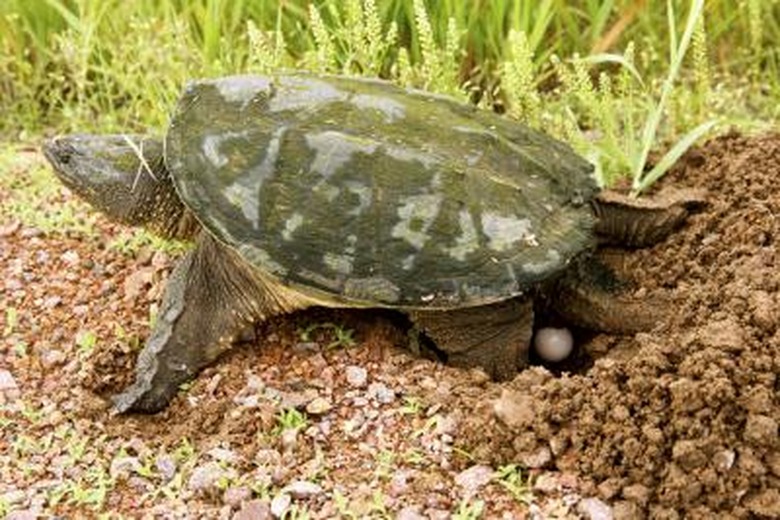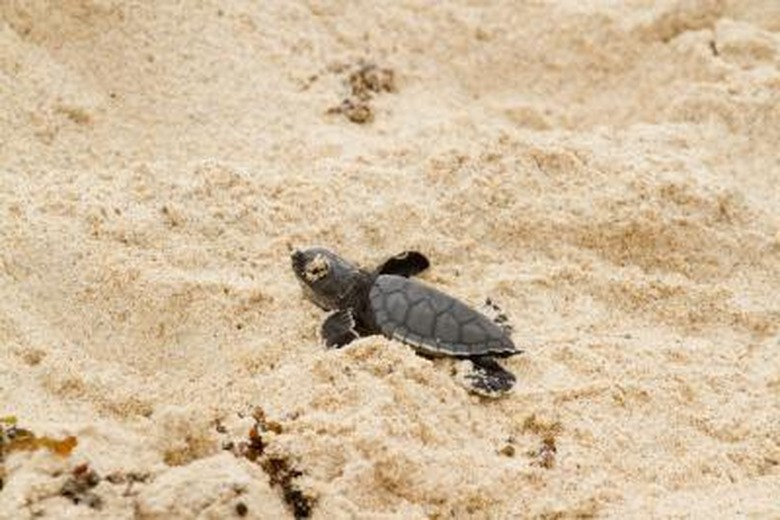Life Cycle Of A Turtle
Turtles are very versatile reptiles, living in a variety of environments on both land and in water. You'll find turtles living in deserts, in the sea, and even in in cold-weather areas where they hibernate to survive the winter. Despite their differences, the life cycle of a turtle follows the same basic pattern as any reptile species.
TL;DR (Too Long; Didn't Read)
Although there are many kinds of turtles, they all go through the basic reptile life cycle: egg, hatchling and adult.
Basic Facts About Turtles
Basic Facts About Turtles
Turtles are aquatic reptiles, while tortoises live on dry land. Sometimes people use the term terrapin to mean either turtle or tortoise, but the terrapin is actually a turtle that lives in brackish water instead of fresh water or the ocean. All these creatures have shells or carapaces, a retractable head, four legs and a tail, though the extent to which they can pull their bodies into their shells varies by species. Some turtles can even snap the shell shut to make it harder for predators to attack them.
Turtles Begin as Eggs
Turtles Begin as Eggs
Though some sea turtles lay their eggs underwater or on beds of moss, most female turtles dig holes in sand or mud and deposit their eggs in clutches made up of one to 100 eggs. The female turtle then buries the eggs. Unlike the Asian giant tortoise, mother turtles do not remain near their eggs to protect them. The egg shell is pliable but leathery and requires the hatchling to use an "egg tooth" to break through when it's ready to emerge, usually in two to three months.
The Next Stage: Hatchling
The Next Stage: Hatchling
In some species of turtle, temperature determines the gender of hatchlings. In warmer temperatures females emerge from the hatching eggs, while in cooler temperatures males emerge. The hatchlings use an "egg tooth" (a small white protrusion on the nose) to break through the egg shell and then immediately head for the water. Sea turtles live their first years in the ocean, and many are omnivorous during this stage, eating plant and animal matter. Turtles that live primarily on land often dig holes in the dirt with their strong, rough feet to keep cool. They also stay inside their shells to both protect their bodies from drying out and to be safe from predators.
Life as an Adult Turtle
Life as an Adult Turtle
Adult turtles can live on either land or water. They can stay underwater for long periods of time but must emerge for air every so often because they have lungs instead of gills like a fish. When it is time to breed, the male often courts the female by rubbing up against her or nodding his head up and down. Other turtle species may bite the female's legs or bump shells with her. Some female turtles will carry their fertilized eggs with them for a year or more, laying them little by little over time. Neither parent is involved in rearing the hatchlings. Adult turtles can be anywhere from less than 5 inches long, like the endangered bog turtle, to over 6 feet long like the leatherback sea turtle, which can weigh up to 1,400 lbs.
Facts About Turtle Life Time
Facts About Turtle Life Time
Turtles grow at a very slow rate, but time does not take much of a toll on their bodies. The organs of an old turtle are almost identical to that of a young turtle. One of the most ancient creatures on earth, the turtle is also one of the longest-lived, with the largest species living the longest. Though the petite painted turtle lives a relatively short 11 years in the wild, some sea turtle life spans can stretch well past 100 years old, much like their long-lived giant tortoise cousins that live on land.
Cite This Article
MLA
Gutierrez, D.M.. "Life Cycle Of A Turtle" sciencing.com, https://www.sciencing.com/life-cycle-turtle-5479641/. 22 November 2019.
APA
Gutierrez, D.M.. (2019, November 22). Life Cycle Of A Turtle. sciencing.com. Retrieved from https://www.sciencing.com/life-cycle-turtle-5479641/
Chicago
Gutierrez, D.M.. Life Cycle Of A Turtle last modified March 24, 2022. https://www.sciencing.com/life-cycle-turtle-5479641/





